By Atticus Zavaletta
One of the shadow gifts of this pandemic has been the urgency that has galvanized energies and brought out leadership where it had been lying fallow. North Ave Mission, which I founded just a month ago together with the homeless and formerly homeless people among whom I minister in Baltimore—and the leaders in it—is one of those gifts.
As a trans person, wherever I am, I am always inevitably called to the margins. If you drop me in the center somewhere, it doesn’t matter where, I will find the edges and quick. Part of it is that I find myself in these places that the world has disregarded, because that’s who I was/am as a Queer and transgender person who grew up in a church that saw me as an abomination. I so desperately needed a theology and a spiritual community that saw in my difference the origins of my beauty and my worth as God’s child, and I had to live through many years of self-destruction, drawing nearer and nearer to death, because of those deep, deep wounds. When I uplift the beauty and dignity of people on the underside of power, I am also healing a part of my self. It is powerful for me to reflect that God uses exactly that part of me that was so broken to facilitate healing in the world.
I am lucky enough to have a Bishop who supports and honors not just my identity but also my calling: in January, I was called by my Bishop to be a street minister on North Avenue in Baltimore, an area home to many street homeless and food and housing insecure people. I began by walking the blocks, getting to know people, and listening to their stories and what needs there were in the neighborhood. One of my first days out, I met PeeWee, who identifies as pansexual, and her husband Nine, who identifies as bisexual. That day, PeeWee, who is like the mayor of the neighborhood, took me around the entire block and introduced me to every single person—elders, dealers on the corners, pizza store guys, and all her friends. PeeWee and Nine are both formerly homeless and they told me of their passion to be there for those going through what they had gone through. Often, PeeWee looks back on that day and says, “If you had never come that day, all of this would never have happened.” I join her in wonder and always reply that the Holy Spirit brought us together.
I started having a weekly presence at a vacant lot, which is a hangout zone for many on the streets. Soon enough, Thursdays became a time when we would gather there for prayer, food and friendship, and to hear updates, listen to concerns, assess needs, and do street outreach by passing out food and essential items on the street together.
 Early on, I identified leaders: we started with Street Shepherds, and then added the role of Guardians. Street Shepherds check on everyone on the street and communicate needs back to me, then we reach out to the wider community when appropriate. They offer support, friendship, and care, and remind us that we are a family. Our Guardian is a supporting, protecting, defending presence, offering wisdom and counsel as we navigate the streets and ministry. The act of drawing in and building up leaders from the margins is a gift of my Queerness–which apprehends value where the world doesn’t always. Queerness has eyes to see, from the margins and from its own experience of alienation, the difference between a theology of glory, which calls things what they aren’t—calling the good bad, and the bad good—and a theology of the cross, which calls things what they really are. As a Queer transgender Christian, I am witness to a theology of the cross.
Early on, I identified leaders: we started with Street Shepherds, and then added the role of Guardians. Street Shepherds check on everyone on the street and communicate needs back to me, then we reach out to the wider community when appropriate. They offer support, friendship, and care, and remind us that we are a family. Our Guardian is a supporting, protecting, defending presence, offering wisdom and counsel as we navigate the streets and ministry. The act of drawing in and building up leaders from the margins is a gift of my Queerness–which apprehends value where the world doesn’t always. Queerness has eyes to see, from the margins and from its own experience of alienation, the difference between a theology of glory, which calls things what they aren’t—calling the good bad, and the bad good—and a theology of the cross, which calls things what they really are. As a Queer transgender Christian, I am witness to a theology of the cross.
When COVID-19 hit, our “fellowship” decided to organize as North Ave Mission because we wanted to walk together through the storm. We successfully fundraised over $8500 to provide free groceries and hygiene and essential items to people. On Maundy Thursday, for instance, we distributed 7,500 lbs of fresh produce.
We asked what else could do in the face of this crisis, and everyone agreed: our priority was to house our street homeless members. So we set up Red Shed Village, where 5 people stay in a beautiful community garden lot in tents. Neighbors and community members immediately stepped up in beautiful ways, for instance by ensuring the Villagers have nutritious meals every day! Interestingly, but not surprisingly, a great majority of the people who leapt out to support the Villagers with food, bedding, masks, toiletries, and other forms of support- are members of the LGBTQ+ community. I believe that is because we in the Queer community know how to recognize the things of hidden but inestimable worth.
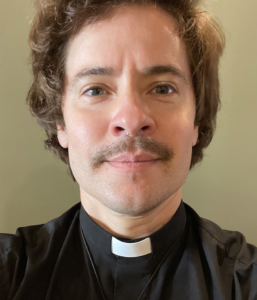 Atticus Zavaletta (he/they) is a Street Minister at North Ave Mission and Vicar at Amazing Grace Lutheran Church in Baltimore, MD.
Atticus Zavaletta (he/they) is a Street Minister at North Ave Mission and Vicar at Amazing Grace Lutheran Church in Baltimore, MD.

 Mark Erson – (he/him/his) serves St. John’s Lutheran Church in Greenwich Village, Manhattan, NY, as pastor. He is also a theatre artist and award-winning playwright. He is most excited and looking forward to working with Reed Noel on their internship in the coming year.
Mark Erson – (he/him/his) serves St. John’s Lutheran Church in Greenwich Village, Manhattan, NY, as pastor. He is also a theatre artist and award-winning playwright. He is most excited and looking forward to working with Reed Noel on their internship in the coming year. We seek community, affirmation, and practice what self-care we can to empower our faltering nerves and exited stumblings. Through it all, the Savior is ever-present, known and unknown, leaving signs for when we are ready to receive them. Beginning with Easter, not ending, we go boldly into the new and unknown, as seekers and receivers. We know we will most certainly miss the face of Jesus when we are grieving or scared, confused or lonely. Jesus will still be there. We will still be loved. God will still, without fail, be working.
We seek community, affirmation, and practice what self-care we can to empower our faltering nerves and exited stumblings. Through it all, the Savior is ever-present, known and unknown, leaving signs for when we are ready to receive them. Beginning with Easter, not ending, we go boldly into the new and unknown, as seekers and receivers. We know we will most certainly miss the face of Jesus when we are grieving or scared, confused or lonely. Jesus will still be there. We will still be loved. God will still, without fail, be working.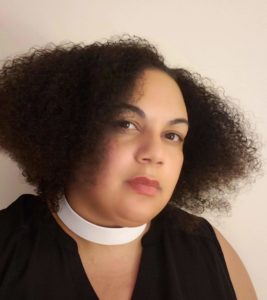 The Rev. Carla Christopher Wilson (she /her/hers) is a redevelopment pastor serving a congregation in Lancaster, PA. Also the co-chair of Lower Susquehanna Synod’s Racial Justice Task Force, Carla is a queer femme Black (and a little Latinx) warrior for justice and equity. A former Poet Laureate of York, PA and a published writer, Carla is passing her quarantine time writing Triduum poetry and cuddling her puppies.
The Rev. Carla Christopher Wilson (she /her/hers) is a redevelopment pastor serving a congregation in Lancaster, PA. Also the co-chair of Lower Susquehanna Synod’s Racial Justice Task Force, Carla is a queer femme Black (and a little Latinx) warrior for justice and equity. A former Poet Laureate of York, PA and a published writer, Carla is passing her quarantine time writing Triduum poetry and cuddling her puppies. Jon Rundquist (he/her/theirs) is a lover of Holy Week, a parent and a spouse, and 2017 MDiv. graduate of Luther Seminary. She’s worked at Target on and off since the end of internship, awaiting her own “what comes next”.
Jon Rundquist (he/her/theirs) is a lover of Holy Week, a parent and a spouse, and 2017 MDiv. graduate of Luther Seminary. She’s worked at Target on and off since the end of internship, awaiting her own “what comes next”. 

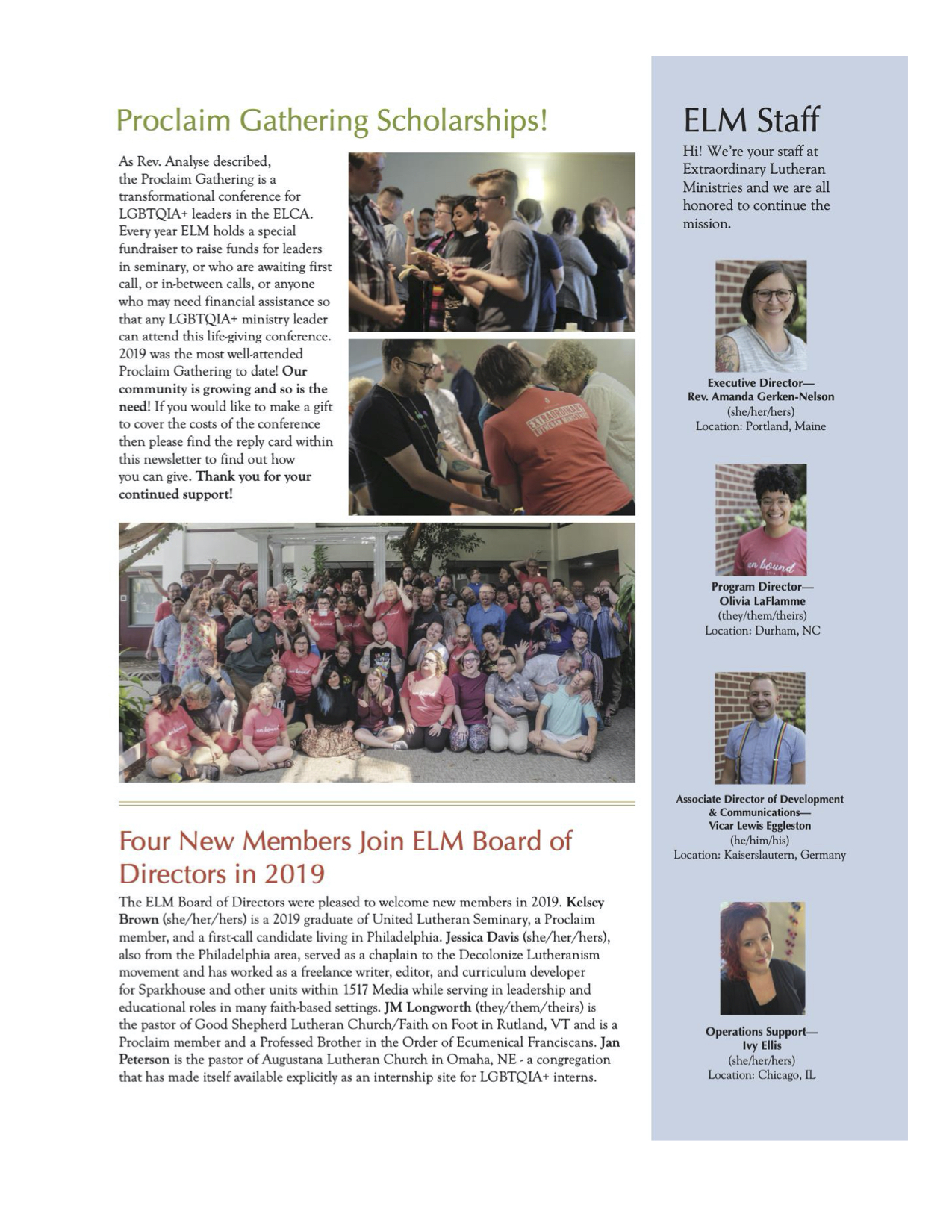
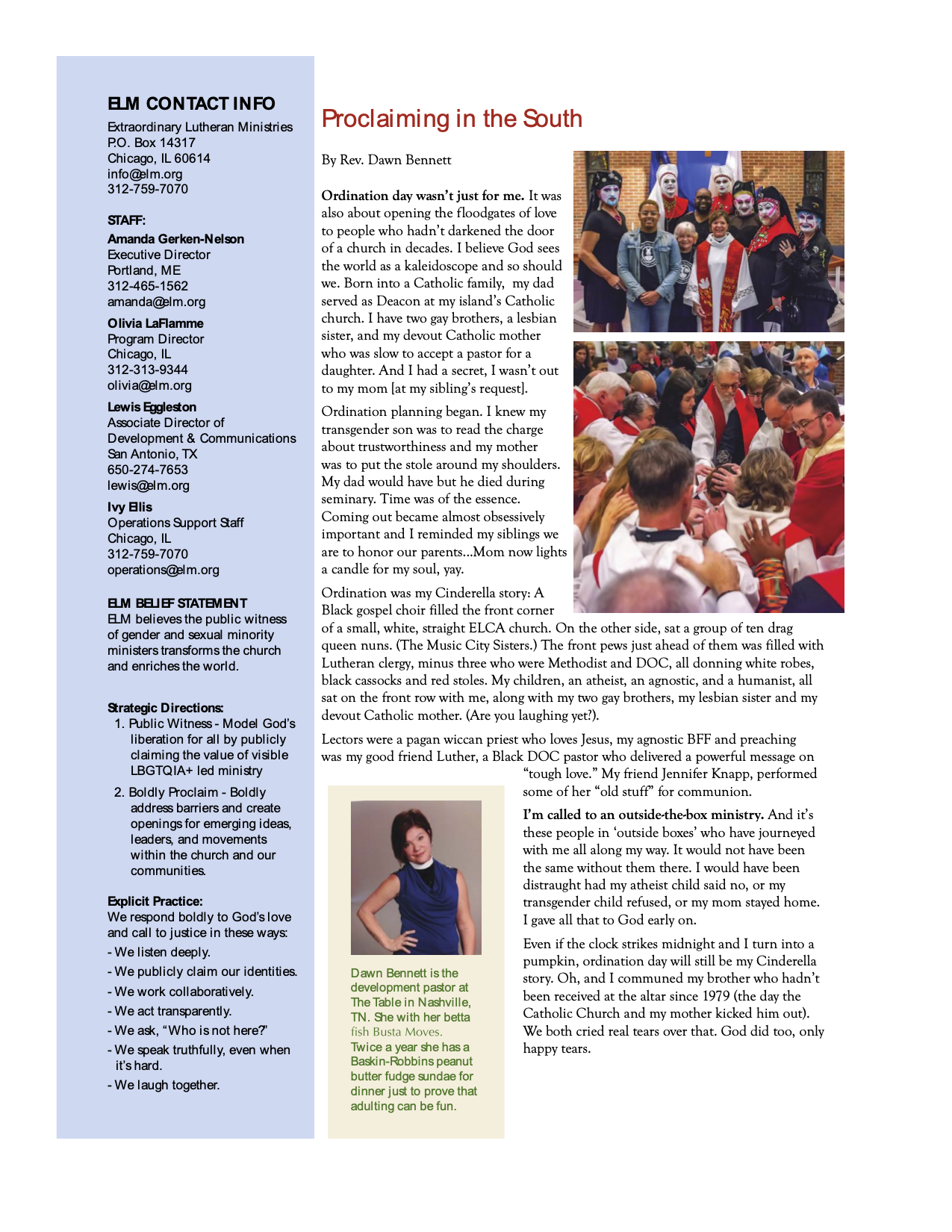
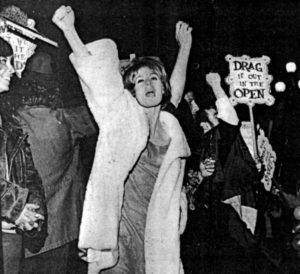
 Elle Dowd (she/her/hers) is a bi-furious seminarian at the Lutheran School of Theology at Chicago and a candidate for ordained ministry in the Evangelical Lutheran Church in America currently serving as the full-time pastoral intern at St. Luke’s Lutheran Church in Logan Square, Chicago. Elle has pieces of her heart in Sierra Leone, where her two children were born, and in St. Louis where she learned from the radical, queer, Black leadership during the Ferguson Uprising. She was formerly a co-conspirator with the movement to #decolonizeLutheranism and currently works as a community organizer with the Faith and Justice Collective and SOUL, writes regularly for the Disrupt Worship Project, and facilitates workshops on gender and sexuality and the Church in both secular conferences and Christian spaces. Elle has interests in queer and feminist Biblical interpretation and liberation and body theology. Elle loves spending time with the people she loves and on weekends, Elle tours the city of Chicago in search of the best brunch.
Elle Dowd (she/her/hers) is a bi-furious seminarian at the Lutheran School of Theology at Chicago and a candidate for ordained ministry in the Evangelical Lutheran Church in America currently serving as the full-time pastoral intern at St. Luke’s Lutheran Church in Logan Square, Chicago. Elle has pieces of her heart in Sierra Leone, where her two children were born, and in St. Louis where she learned from the radical, queer, Black leadership during the Ferguson Uprising. She was formerly a co-conspirator with the movement to #decolonizeLutheranism and currently works as a community organizer with the Faith and Justice Collective and SOUL, writes regularly for the Disrupt Worship Project, and facilitates workshops on gender and sexuality and the Church in both secular conferences and Christian spaces. Elle has interests in queer and feminist Biblical interpretation and liberation and body theology. Elle loves spending time with the people she loves and on weekends, Elle tours the city of Chicago in search of the best brunch.